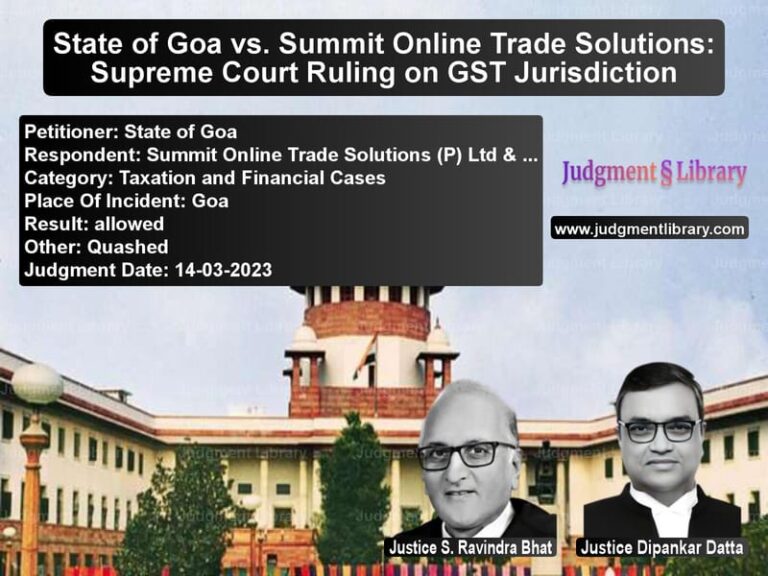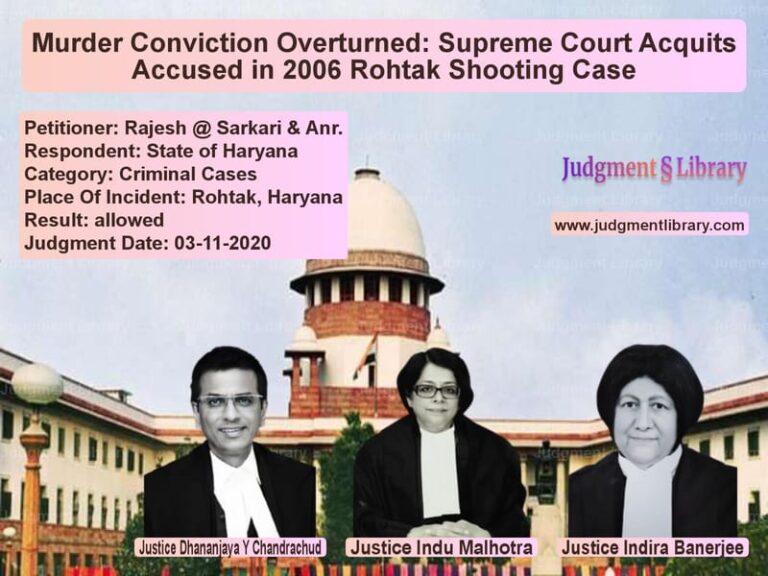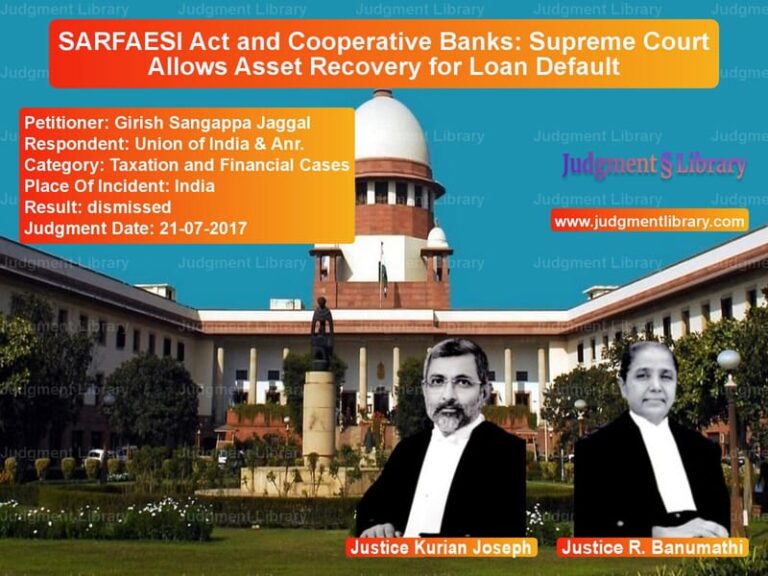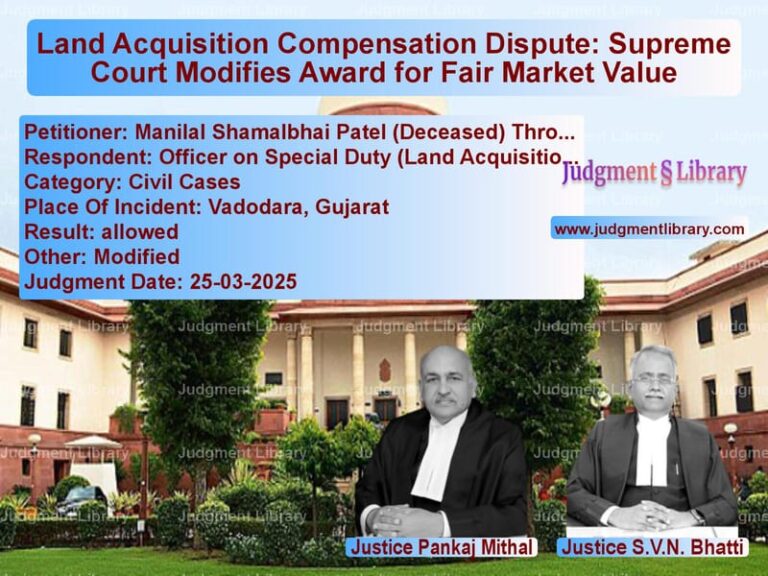Writ Petition Against Private Minority Schools: Supreme Court Clarifies Legal Position
The case of St. Mary’s Education Society & Anr. vs. Rajendra Prasad Bhargava & Ors. deals with a significant question in Indian constitutional law: Can an employee of a private unaided minority educational institution challenge their termination through a writ petition under Article 226 of the Constitution? The Supreme Court in this case set an important precedent regarding the applicability of writ jurisdiction over private institutions.
Background of the Case
The dispute arose when Rajendra Prasad Bhargava, an office employee of St. Mary’s Education Society, was terminated from service following a disciplinary inquiry. The private unaided minority institution issued a show cause notice and a charge sheet against him, citing misconduct on various grounds. After conducting a departmental inquiry, the institution dismissed him from service on May 8, 2015.
The terminated employee challenged the order before the Disciplinary Committee of the institution under Rule 49 of the CBSE Affiliation Byelaws. The committee, after considering his appeal, upheld the termination.
Dissatisfied with the decision, the respondent approached the Madhya Pradesh High Court under Article 226 of the Constitution, filing a writ petition against the termination. The institution contested the maintainability of the writ petition, arguing that as a private unaided minority institution, it was not a ‘State’ under Article 12 and therefore not amenable to writ jurisdiction.
Legal Issues Before the Court
The Supreme Court was required to examine two key questions:
- Is a writ petition under Article 226 of the Constitution maintainable against a private unaided minority institution?
- Can a service dispute between a private educational institution and its employee be adjudicated through a writ petition?
Arguments Presented
Petitioners’ (Institution’s) Arguments
- The institution argued that it was a private unaided minority educational institution, protected under Article 30(1) of the Constitution.
- The dispute was purely contractual in nature and did not involve any public law element.
- The institution’s decisions were not subject to judicial review through a writ petition as it was not performing a public function in the context of employment decisions.
- The High Court erroneously relied on Marwari Balika Vidyalaya vs. Asha Shrivastava and Ramesh Ahluwalia vs. State of Punjab, which were distinguishable from the present case.
Respondent’s (Employee’s) Arguments
- The employee contended that the school was affiliated with the CBSE and governed by its rules, making it subject to writ jurisdiction.
- Since the institution was performing a public function by imparting education, its actions were subject to judicial review.
- He claimed that he was a victim of unfair disciplinary proceedings and sought reinstatement with all consequential benefits.
- He cited financial hardships and his family’s medical issues as reasons for seeking relief from the court.
Supreme Court’s Observations
On Writ Jurisdiction Against Private Institutions
The Supreme Court, comprising Justice Aniruddha Bose and Justice J.B. Pardiwala, observed:
“A writ petition under Article 226 is maintainable against a private body if it performs a public duty or function. However, this principle does not extend to purely contractual matters such as employment disputes.”
On the Nature of Public Duty
The Court clarified that while a private unaided educational institution is engaged in the public function of imparting education, this does not mean that all its actions are subject to writ jurisdiction. The Court noted:
“Even if an institution performs a public function, only those of its decisions that involve a public law element can be judicially reviewed under writ jurisdiction.”
On the Distinction Between Public and Private Law
The Court emphasized the distinction between public and private law remedies:
“A private unaided minority educational institution is not an instrumentality of the State under Article 12. While its decisions related to education and student admissions may be subject to judicial review, employment matters fall within the realm of private contract law.”
Judgment and Its Implications
The Supreme Court ruled in favor of the institution and set aside the High Court’s decision. The key takeaways from the judgment are:
- A writ petition against a private unaided minority educational institution is not maintainable unless the issue involves a public duty.
- Employment disputes between private institutions and their employees do not have a public law element and should be resolved through appropriate legal channels, such as civil suits.
- The decision protects the autonomy of private minority institutions while ensuring that their core public function—education—remains subject to judicial oversight where necessary.
Significance of the Judgment
- Clarifies the Scope of Article 226: The judgment reinforces that not all actions of private entities performing public functions are subject to writ jurisdiction.
- Upholds Minority Institutions’ Autonomy: By ruling that service matters fall outside the scope of judicial review under Article 226, the Court ensures that private minority institutions retain administrative independence.
- Distinguishes Between Public and Private Law: The ruling reinforces that employment disputes should be addressed through civil courts rather than constitutional writs.
Conclusion
The Supreme Court’s decision in St. Mary’s Education Society & Anr. vs. Rajendra Prasad Bhargava & Ors. is a landmark ruling in Indian education law. It sets a clear precedent that writ petitions under Article 226 are not maintainable for employment disputes in private unaided minority institutions. This ensures that while these institutions continue to perform their public function of imparting education, they retain control over their internal administration without unnecessary judicial intervention.
For employees of such institutions, the ruling underscores the importance of contractual obligations and the necessity of seeking remedies through civil courts or other appropriate forums rather than constitutional writs.
Petitioner Name: St. Mary’s Education Society & Anr..Respondent Name: Rajendra Prasad Bhargava & Ors..Judgment By: Justice Aniruddha Bose, Justice J.B. Pardiwala.Place Of Incident: Madhya Pradesh.Judgment Date: 23-08-2022.
Don’t miss out on the full details! Download the complete judgment in PDF format below and gain valuable insights instantly!
Download Judgment: st.-mary’s-education-vs-rajendra-prasad-bhar-supreme-court-of-india-judgment-dated-23-08-2022.pdf
Directly Download Judgment: Directly download this Judgment
See all petitions in Employment Disputes
See all petitions in Termination Cases
See all petitions in Public Sector Employees
See all petitions in Judgment by Aniruddha Bose
See all petitions in Judgment by J.B. Pardiwala
See all petitions in allowed
See all petitions in Quashed
See all petitions in supreme court of India judgments August 2022
See all petitions in 2022 judgments
See all posts in Service Matters Category
See all allowed petitions in Service Matters Category
See all Dismissed petitions in Service Matters Category
See all partially allowed petitions in Service Matters Category







